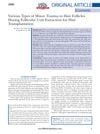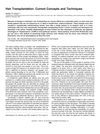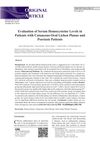1 citations,
January 2017 in “Annals of dermatology/Annals of Dermatology” Mineral levels in hair don't significantly affect the severity of atopic dermatitis in children.
 35 citations,
August 1980 in “Circulation”
35 citations,
August 1980 in “Circulation” Minoxidil may cause heart issues in animals and humans.
 14 citations,
March 2017 in “Plastic and reconstructive surgery. Global open”
14 citations,
March 2017 in “Plastic and reconstructive surgery. Global open” Hair follicle damage happens during hair transplants and can impact success; better surgical methods are needed.
54 citations,
September 2012 in “Acta ophthalmologica” Cancer treatments can cause various eye problems, so eye doctors should know how to diagnose and treat these early.
 3 citations,
December 2020 in “Endocrine and metabolic science”
3 citations,
December 2020 in “Endocrine and metabolic science” The healthcare for transgender veterans could be better with a more unified team approach.
 7 citations,
January 2015 in “Dermatology”
7 citations,
January 2015 in “Dermatology” Two gene variations, rs6493497 and rs7176005, may be linked to female hair loss in Chinese people.
 10 citations,
August 2020 in “International Journal of Andrology”
10 citations,
August 2020 in “International Journal of Andrology” 5α-reductase inhibitors like finasteride may not be effective or safe for transgender individuals, and more research is needed.
 10 citations,
August 2014 in “Skin research and technology”
10 citations,
August 2014 in “Skin research and technology” Sleep, testosterone levels, and a specific enzyme activity affect skin oil production in women.
 30 citations,
October 2005 in “Journal of Investigative Dermatology Symposium Proceedings”
30 citations,
October 2005 in “Journal of Investigative Dermatology Symposium Proceedings” The document concludes that hair transplantation is recommended for those not helped by medical treatments, but warns that high-density transplants may lower hair survival rates.
 17 citations,
June 2019 in “BMC genomics”
17 citations,
June 2019 in “BMC genomics” Non-coding RNAs help control hair growth in cashmere goats.
 4 citations,
August 2018 in “Journal of Cosmetic Dermatology”
4 citations,
August 2018 in “Journal of Cosmetic Dermatology” Actual harvested hair follicles were fewer and differed in type from estimated, with older patients and those with multiple transplants needing more careful planning.
 January 2024 in “RSC pharmaceutics”
January 2024 in “RSC pharmaceutics” Removing the outer skin layer increases drug absorption and offers non-invasive treatment options, with some methods allowing for quick skin recovery.
 10 citations,
February 2016 in “The Journal for Nurse Practitioners”
10 citations,
February 2016 in “The Journal for Nurse Practitioners” Healthcare providers need better education and resources to give competent and sensitive care to transgender patients.
 8 citations,
May 2019 in “Indian Journal of Plastic Surgery/Indian journal of plastic surgery”
8 citations,
May 2019 in “Indian Journal of Plastic Surgery/Indian journal of plastic surgery” Plasma is better than Ringer's lactate for hair graft survival and growth after transplantation.
 10 citations,
January 2012 in “International Journal of Trichology”
10 citations,
January 2012 in “International Journal of Trichology” PRP helps hair growth in common hair loss disorder.
1108 citations,
January 2018 in “Dalton transactions” Platinum-based chemotherapy drugs can cause many severe side effects, often requiring dose reductions and additional medications to manage.
 December 2023 in “Research and reports in urology”
December 2023 in “Research and reports in urology” A young man with high-grade prostate cancer had successful surgery and good recovery, highlighting the need for awareness in younger men.
 21 citations,
November 2011 in “The journal of investigative dermatology/Journal of investigative dermatology”
21 citations,
November 2011 in “The journal of investigative dermatology/Journal of investigative dermatology” Telogen is an active phase with important biological processes, not a resting phase.
 January 2024 in “Medicina estética/Medicina estética”
January 2024 in “Medicina estética/Medicina estética” Es crucial diferenciar entre dermatitis seborreica y liquen plano antes de un trasplante capilar para asegurar mejores resultados.
 5 citations,
September 2012 in “Springer eBooks”
5 citations,
September 2012 in “Springer eBooks” Nanoparticles can be used to deliver drugs to hair follicles, potentially improving treatments for conditions like acne and alopecia, and could also be used for vaccine delivery and gene therapy.
 75 citations,
October 2010 in “Mammalian genome”
75 citations,
October 2010 in “Mammalian genome” Sphynx cats are hairless and Devon Rex cats have curly hair due to specific genetic mutations.
 3 citations,
September 2017 in “Galen medical journal”
3 citations,
September 2017 in “Galen medical journal” Patients with psoriasis and cutaneous-oral lichen planus have higher blood homocysteine levels than healthy people.
 93 citations,
January 2016 in “British Journal of Dermatology”
93 citations,
January 2016 in “British Journal of Dermatology” Eating a high-glycemic diet may worsen acne by increasing certain protein levels and expressions in the skin.
 66 citations,
January 2000 in “Hormone Research in Paediatrics”
66 citations,
January 2000 in “Hormone Research in Paediatrics” Androgens can both promote and prevent hair growth due to differences in gene expression in hair follicles.
 November 2018 in “Springer eBooks”
November 2018 in “Springer eBooks” Children need early diagnosis and treatment for iron-deficiency anemia to prevent learning problems and promote health.
 October 2024 in “Journal of the Endocrine Society”
October 2024 in “Journal of the Endocrine Society” Gender-affirming hormone therapy affects metabolism differently based on treatment type.
 140 citations,
December 2017 in “Journal of Controlled Release”
140 citations,
December 2017 in “Journal of Controlled Release” Microneedles improve drug delivery in various body parts, are safe and painless, and show promise in cosmetology, vaccination, insulin delivery, and other medical applications.
 March 2024 in “Romanian Medical Journal”
March 2024 in “Romanian Medical Journal” Inositol shows promise in treating PCOS and other health issues, but more research is needed.
 44 citations,
June 2006 in “Biological & Pharmaceutical Bulletin”
44 citations,
June 2006 in “Biological & Pharmaceutical Bulletin” Androgen hormones cause hair follicle scarring in hair loss, and finasteride helps reduce it.
 11 citations,
January 2012 in “International Journal of Trichology”
11 citations,
January 2012 in “International Journal of Trichology” Caffeine may help hair growth in hereditary hair loss.


























